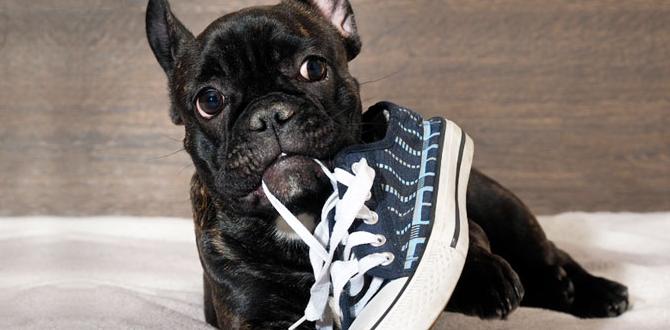Every night, when the world is quiet, you might hear a soft whine. Why is your older dog making these sounds? Could it be a dream, or is something else happening? Many pet owners ask about this. Understanding dog whining at night in older dogs is important. Let’s explore why it happens and what you can do.
Key Takeaways
- Older dogs might whine due to discomfort or pain at night.
- Check for health issues if whining becomes frequent.
- Comfort and routine can help reduce nighttime whining.
- Consult a vet to understand changes in behavior.
- Dog whining at night in older dogs may indicate anxiety.
Understanding Dog Whining At Night
Older dogs might whine at night for many reasons. Sometimes they feel discomfort, like joint pain or an upset stomach. Other times, it could be anxiety or confusion. It’s important to observe their behavior. Whining might be a way to communicate they need help. Understanding the reason can guide you in helping them feel better. Offering comfort and a consistent night routine can also be beneficial.
- Check your dog’s sleeping area for comfort.
- Monitor for signs of pain or discomfort.
- Observe any changes in their routine.
- See if they need more bathroom breaks.
- Consider their diet and eating habits.
- Ensure they have a cozy bed to rest.
Sometimes, older dogs develop cognitive issues. This may lead to confusion, especially at night. If your dog seems lost or disoriented, it might be time to see a vet. They can guide you on possible solutions. Medication or special training might help. Knowing what your dog needs is key to solving nighttime whining.
Fun Fact or Stats : Dogs have been human companions for over 14,000 years!
Is It Pain or Discomfort?
When older dogs whine at night, is it due to pain? This is a common question. As dogs age, they can develop arthritis or other joint problems. These conditions can cause nighttime discomfort. Dogs may whine to express their feelings. It’s similar to how we might groan when getting out of bed. Observing your dog’s movement can give clues. Is your dog limping or avoiding stairs? These signs might suggest pain. A visit to the vet can help confirm. They may recommend treatments to ease discomfort. Your dog’s comfort is important, especially at night.
Is Anxiety the Culprit?
Could anxiety cause your dog’s whining? Older dogs can feel anxious at night. They might become worried when left alone. This is similar to how kids feel in the dark. Some dogs need reassurance that everything is okay. Creating a calming bedtime routine might help. Think about soft music or a favorite toy. These can bring comfort to an anxious dog. Sometimes, even a small night light might help. Always observe your dog’s behavior. If anxiety seems the cause, gentle care can make bedtime peaceful again.
Is It Time for a Vet Visit?
When should you take your dog to the vet? If whining persists, a vet visit is wise. They can check for health issues. Sometimes, whining is a sign of illness. Early detection can help manage problems better. A vet can provide guidance on care. They might suggest diet changes or medication. Your dog’s health is essential. Regular vet visits ensure they stay healthy. Always trust your instincts. If something feels off, it’s always better to check. A healthy dog is a happy dog.
How Diet Changes May Help
Did you know diet affects an older dog’s behavior? Sometimes, what they eat changes how they feel. Dogs need balanced nutrients, especially when they age. An unbalanced diet might lead to discomfort. If a dog’s stomach hurts, they might whine at night. Adjusting their diet can help. Consult with your vet about the best food options. They can recommend a diet that meets your dog’s needs. Changing their diet might reduce whining and improve health.
- Consider foods with glucosamine for joint health.
- Avoid foods that cause allergies or discomfort.
- Ensure they have enough water daily.
- Provide small, regular meals to avoid upset stomachs.
- Look for high-quality dog foods.
By choosing the right diet, you can help your dog feel better. Older dogs can be sensitive to diet changes. Make transitions slowly. Monitor their behavior during the change. If they seem happier and whine less, the diet might be working. Remember, a healthy diet supports a happy life.
Fun Fact or Stats : Dogs have amazing senses and can hear sounds four times farther than humans!
| Symptom | Possible Cause | Solution | Vet Needed? |
|---|---|---|---|
| Whining | Anxiety | Calming routine | Sometimes |
| Limping | Pain | Pain relief | Yes |
| Restlessness | Discomfort | Check bedding | Sometimes |
| Confusion | Cognitive issues | Vet advice | Yes |
Creating a Cozy Sleeping Area
Where does your dog sleep? Their sleeping area affects their comfort. Older dogs may need more warmth and softness. Check if their bed is supportive. Drafts or cold floors can cause discomfort. Making their space cozy can reduce nighttime whining. A soft blanket or a comfy bed might be the solution. Consider where their bed is located too. A quiet, safe spot is ideal. Keep noise and distractions to a minimum. Your dog should feel secure and relaxed.
- Pick a soft, supportive bed.
- Ensure the area is draft-free.
- Keep the space quiet at night.
- Consider adding a warm blanket.
- Place the bed in a familiar spot.
- Remove any clutter around the bed.
When your dog feels cozy, they can sleep better. A good night’s sleep is essential for their health. It’s like humans needing a comfortable bed for restful sleep. You might notice less whining when their space is perfect. Take time to set up the ideal sleeping area.
Fun Fact or Stats : Dogs sleep for 12-14 hours a day!
Importance of Regular Vet Visits
Do regular vet visits matter for older dogs? Yes, they do. As dogs age, their bodies change. Regular check-ups can catch issues early. Vets can help with joint pain, diet, and behavior. They know what to look for in older dogs. Keeping up with vaccinations and check-ups is important. It ensures your dog stays healthy and happy. A vet can also advise on nighttime whining. They might suggest exercises or routines that help. Your dog’s health is in your hands, with a little help from the vet.
- Schedule regular vet visits.
- Discuss any changes in behavior.
- Follow vet advice on diet and care.
- Keep vaccinations up to date.
- Ask about supplements for aging dogs.
Building a good relationship with your vet is important. They can offer support and advice. If your dog whines at night, the vet may have solutions. Regular visits let you address any changes early. Always make sure your furry friend gets the care they need.
Fun Fact or Stats : A dog’s sense of smell is 10,000 to 100,000 times better than humans!
Conclusion
Understanding dog whining at night in older dogs can improve their life. Check for health issues and ensure comfort. Consult vets to rule out serious problems. A warm, cozy sleeping area helps too. With care, nighttime whining can reduce, leading to peaceful nights for everyone.
FAQs
Question: Why does my older dog whine at night?
Answer: Many older dogs whine at night due to discomfort, pain, or anxiety. It’s essential to check for any changes in their health or environment. Regular vet visits can help identify the cause. Comforting routines may also reduce their anxiety.
Question: Can diet affect my dog’s nighttime whining?
Answer: Yes, diet can influence a dog’s behavior. An unbalanced diet might lead to discomfort or pain. Consult with a vet to ensure your dog receives the right nutrients. A healthy diet supports better sleep and reduces whining.
Question: Is whining at night a sign of illness?
Answer: It could be. Dog whining at night in older dogs might signal health issues. If the whining is persistent, consult a vet. They can check for pain or other health concerns and provide solutions.
Question: How can I create a better sleeping space for my dog?
Answer: Ensure your dog’s sleeping area is cozy and comfortable. Provide a soft, supportive bed in a quiet, warm spot. Use soft blankets and remove any drafts. A peaceful sleeping space can reduce nighttime whining.
Question: What role does exercise play in reducing whining?
Answer: Regular exercise helps dogs stay healthy and relaxed. It can reduce anxiety and improve sleep quality. Ensure your older dog gets gentle exercise suitable for their age. This can lead to less whining at night.
Question: Should I worry if my dog whines only occasionally?
Answer: Occasional whining might not be a concern. However, if it becomes frequent or intense, investigate further. Changes in behavior can signal a problem. Always monitor and consult a vet if unsure.
Meet Elyse Colburn, the devoted canine companion and storyteller behind the enchanting world of “Tales, Tails, and Adventures Unleashed.” A passionate dog enthusiast with a heart full of paw prints, Elyse Colburn shares heartwarming tales and insightful adventures, celebrating the joy, loyalty, and endless antics that make every dog a true hero. Join Elyse Colburn on this tail-wagging journey, where every post is a love letter to our four-legged friends.








